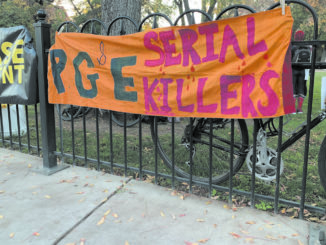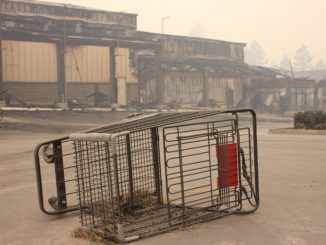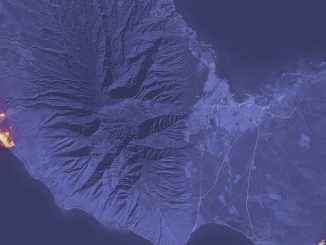
I still get anxiety when I visit Paradise. I go up there only occasionally, mostly to visit a friend who, thankfully, lives just off the main drag.
I’m all right if I stay on or near the Skyway, but I start white-knuckling when I venture deeper into some of the arterial streets and see lot after empty lot, everyday reminders of California’s deadliest and most destructive wildfire.
Before the Camp Fire, if you asked me to describe the Ridge, I’d probably talk about the spectacular views of Butte Creek Canyon from Bille Park; or Feather River Hospital’s popular maternity ward, the Birth Day Place, where I had my son; or Mendon’s Nursery and its amazing selection of plants and fountains.
But now, when the subject comes up, my mind goes straight to the blaze. What I witnessed the morning after the disaster haunts me to this day, three years later. I can only imagine what it’s like for those who drove through flames on Nov. 8, 2018. And considering we’ve since become the wildfire epicenter of the West—a phrase I’ve been calling Butte County in the wake of last year’s Bear/North Complex Fire and this summer’s seemingly endless Dixie Fire—it’s increasingly difficult to get beyond the trauma.
Aside from the psychological scars, many haven’t managed to get back to a place that resembles their previous life. In fact, some aren’t able to meet their basic needs. Over the past three years, CN&R reporter Ashiah Scharaga has written about the plight of such individuals. That includes people who ended up in temporary housing provided by the Federal Emergency Management Agency (see “Out of time”).
However, as of mid-September, that safety net is gone. I recently read a story in the Washington Post about the closure of the Chico FEMA camp off Hegan Lane. In it, the reporter chronicles one couple’s tragic last days in the trailer park. They were renters on the Ridge, so they didn’t get an insurance payout to re-establish themselves.
Life wasn’t easy before the fire, but it wasn’t the unmitigated nightmare that they’ve been experiencing post-blaze. The wife is severely disabled and her husband’s life is devoted to caring for her extensive needs. The couple’s adult children could help, but FEMA barred them from residing in the trailer due to some bureaucratic red tape. Their daughter is herself a survivor who is now living in a tent at the Comanche Creek homeless encampment in Chico.
Despite attempts to locate a new home, the couple found nowhere to go by FEMA’s move-out deadline. A good Samaritan paid for a week’s stay in a motel after they were turned out, but there was no plan beyond that.
One of the things that struck me was that the government spent over $300,000 per trailer to establish the facility, an effort ostensibly to keep people from ending up on the streets, only to eventually cut its occupants loose into extremely uncertain futures. What a wasted opportunity.
I mean, think of what that amount of money could have done for the aforementioned couple and others like them. It literally could have bought them a home of their own outright. What a life-changing proposition that would have been.
I can hear naysayers now: “That’s not cool, I had to buy my own house.” Or, “Why should my tax dollars be used by the government to buy someone a home?”
My response: Why the hell not?
Seriously. Why not put the money toward permanent housing rather than spending the same amount for a temporary fix? In terms of whether these people deserve it, I’d argue they do. They survived the biggest disaster of 2018, have endured extreme trauma and uncertainty, and most likely have had years shaved off their lifespan.
This is just one lesson from the Camp Fire, but it’s important and ties right into the ethical and legal dilemma Chico finds itself in with the homeless population. The question is whether we’re ready to learn from it and allow the government to significantly help people who are struggling to keep a roof over their heads.




Be the first to comment